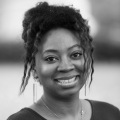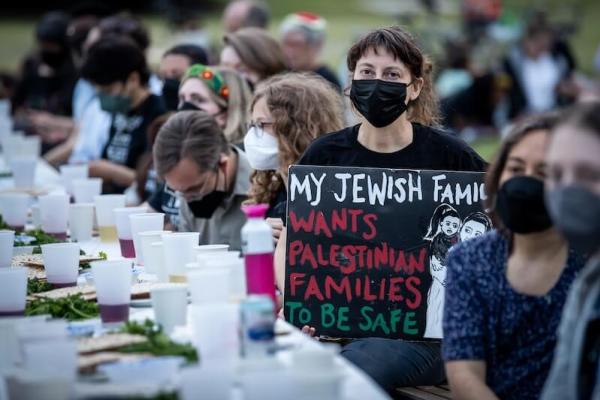Eric L. Motley, former special assistant to George W. Bush and current Executive Vice President of the Aspen Institute, shares on the hard knocks and treasures of growing up in a largely poor African-American town during the height of the civil rights era in his memoir Madison Park: A Place of Hope. In the memoir, Motley chronicles his journey from a rural town founded by freed slaves in Alabama to navigating the political terrain of the White House. Motley recounts formative and disappointing experiences around the issue of race and highlights some of the small-town heroes that poured into his life as a child. The memoir provides a thoughtful reflection of how faith and radical love within a tight-knit community can significantly impact a person’s life.
Motley recently spoke with Sojourners about his story.
This interview has been lightly edited for length and clarity.
J.S.: What inspired you to tell this story? Why now?
E.M.: This is really a story about community, about the power of networks, and what can really happen when people work together and lift each other up and reach across fences. I think if there is a time that we as Americans citizens need to be reminded of the things that we have in common, it’s now.
I wanted to also write it because I wanted to remind people that hope is perennial and that every generation, every age has challenges that seem insurmountable, and yet only with hope are we able to really see our way clearly, finding solutions and solving these problems.
I wanted to celebrate a very special place that I grew up in that was founded by freed slaves who had hope and perseverance. No one had significantly — in my opinion — written anything to celebrate this place called Madison Park, Ala. It’s an homage to my upbringing. It’s a homage to my ancestors who founded this place as freed slaves. It’s an homage to their descendants who are still living there and making life work.
The subtitle of the book is A Place of Hope. What is the hope that Madison Park represents for you?
Someone could sit down with any of us today and list without getting exhausted everything that would make us feel hopeless or despondent. Whenever I feel like the world is against me or challenges seem to overwhelm me, I remember this little band of freed slaves who had nothing but the clothes on their backs, some dreams and aspirations, and a lot of hope. They didn’t know if buying this plantation was going to be sustainable. They didn’t know that after buying this plantation, some other former slave owner was not going to pop in and try to take it away from them. They had spent all their lives with the law not on their side, but they had hope. Their hope was that the same God that brought us through this will take us onward and he will provide.
It is standing and looking back and realizing that without hope, those who brought me to this point would not have been able to bring to this point. It is looking forward and realizing that without hope, there is no way forward
How does your experience growing up in Madison Park impact your thoughts about how society should handle some of these same types of injustices today?
I learned the value of community and even with the integration of the schools in Montgomery, it required our people in our community to work harder to make sure that we were helping each other in ways that we could no longer help each other by going to the same school. It also reminded me that we don’t live just in Madison Park. I grew up in this African-American community but I had to go to school every day on bus into the city of Montgomery, Ala. You have to understand people who live outside of your own little community and neighborhood. One of the reasons I have been able to kind of translate society at large very well is that at a very early age I realized I have to understand the way other people talk and what they talk about and why they talk about what they talk about. The entire world doesn’t look and smell and feel like Madison Park. That does not mean that Madison Park is any less but it does mean that Madison Park is different. Every community we live in is different. We need to become more aware and more cognizant of the differences other people exercise and live.
What was most challenging about writing this memoir?
I’m a writer. I love to write. I can sit down and write all day. What was hard was going back and re-writing. You’re always trying to go back and make things tighter and make sure that every story you tell, someone else can relate to — that’s hard. I think your question gets to something even more complex. My grandmother used to say don't hang out your dirty laundry so that other people could see it. When you write a memoir and you really want to write a real memoir, you gotta tell people everything. Maybe not everything, but you’ve got to help them realize that ‘life just ain’t no crystal stair’ as Langston Hughes would say. You gotta reveal that there are places where there is no carpet and the nails are coming undone and the boards are coming undone.
There were a lot of things I decided that I wanted to forget and not talk about. What you do is put those memories and experiences in boxes and take out the duct tape and tape it up and put it in the attic of your heart and your mind with no intention of ever going back and opening that stuff up again. It required me going back into the attic of my heart and mind, taking out those boxes and slowly removing the Band-Aid, slowly removing the duct tape and opening stuff that had been sealed a long time ago and dealing with it. That was hard. That was extremely challenging to do and I’m glad I did it. I think the reader gets a better book and I think in the process I become a better person.
Can you talk about how your faith has been impacted by your journey? How was it strengthened?
In my house, we didn’t talk a lot about faith. We tried to live it. We tried to make sure that we lived our faith more than we talked about it. It’s a part of who I am, my thoughts, my words, my deeds, and I think we all struggle with how to make our faith work in whatever environments we are in.
What was it like to work with President Bush in the White House?
Whoever you are, whatever president that’s in the White House, it’s always an honor to work in the White House. I have tons of friends who worked for President Clinton and when they talk about their years in the White House, they get excited because it’s one of the great opportunities to serve your country. It’s an incredible opportunity to learn and to work with some of the most brilliant and committed individuals who want to make a difference. It was a very fulfilling experience. I got to spend a lot of time with the president. I learned a lot about how his mind works. I also got to understand what most people in America don’t get to understand … I had the benefit of seeing up close, how hard and complex the world is, what demands and pressures there are on the people who work in the White House, how hard it is to understand what to do when there’s so many voices telling you to do so many different things; every thing has major implications. It was a great learning opportunity for me to realize that life is hard at the top and it takes a lot of strength, a lot of prayer and a lot of focus.
What do you hope people take away from your story?
At the end of the day, only through working together and supporting one another and lifting each other up and affirming our goodness and our value and our worth can we truly realize our individual ability and our collective ability as a community. It’s a reminder that community is important and that community is not just a place — it’s an idea. Wherever I go, I take the idea of community. Community is getting to know your neighbor and reaching across party lines. Community is something that calls us outside of ourselves into a larger more purposeful meaning and existence.
Your background has given you the unique opportunity to sit at the intersection of race and class. What have you learned in those spaces?
I think I’ve become less angry and more understanding that people are complicated. People are very complicated. I had a conversation with a friend earlier today about someone who was prejudiced and I said, ‘Look, he grew up in a little town where that was OK. And so he’s carrying some of that baggage with him.’ Now, the great challenge is how long is he going to carry the baggage before he lets it go now that he’s in a different world.
I think I’ve become a bit more sympathetic and understanding of where people are coming from because I realize that we come from many different places and we carry with us a lot of stuff. I find it really insulting when people say things like ‘I could never be in a relationship with a black person or I could never be in a relationship with a white person or I could never vote for a Democrat or I could never vote for a Republican or I could never do whatever.’ I think when you are able to step outside of what you do every day and you see that other people live different lives, you can appreciate the fact all the more that we’re all different. We have a lot in common but we’re all different and we’re different for a number of reasons.
Standing at the intersections has allowed me to be a bit more sympathetic and understand people a bit more, and it’s made me more humble.
Got something to say about what you're reading? We value your feedback!







